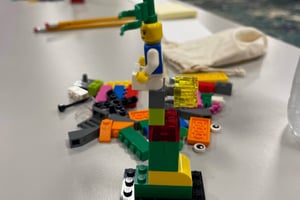As a coach, listening to leaders struggle daily in their delegation efforts, I can tell you this is...
Designing Leadership Development Programs That Advance New Managers
Developing new managers as they transition from individual contributors to leadership roles is a critical task that comes with a lot of support options. While HR Leaders and Executives have a multitude of tools and resources at their disposal to aid in the development of their new managers, however it is not always clear which resource to leverage. In this post, we'll delve into the differences between training, mentorship, job shadowing, and coaching, all of which are powerful resources for leadership development.
1. Training: Building the Foundation
Training is the cornerstone of leadership development. It involves structured programs that equip new managers with the necessary skills and knowledge to perform their roles effectively. Training focuses on providing a comprehensive understanding of leadership principles, team management, communication, conflict resolution, and other essential managerial skills.
Key Components of Well Designed Trainings:
- Formal Curriculum: Training programs follow a structured curriculum tailored to the organization's needs, often involving workshops, seminars, and online courses.
- Skill Enhancement: Training focuses on building a strong foundation of leadership skills, enhancing both hard and soft skills crucial for managerial success.
- Structured Learning: Training provides a systematic approach to learning, covering a wide range of topics within a limited time frame.
- Applicability: While training lays the groundwork, additional strategies like mentorship and coaching are needed for practical application and personalized guidance.
2. Mentorship: Guiding Through Experience
Mentorship is a valuable tool for leadership development that pairs new managers with experienced individuals within or outside the organization. This approach provides new managers with a trusted advisor who offers guidance, shares experiences, and imparts wisdom gathered over their own leadership journey.
Key Components of Well Designed Mentorship:
- Personalized Guidance: Mentorship is a one-on-one relationship where new managers receive personalized advice, helping them navigate challenges and decisions.
- Experience Sharing: Mentors share real-world insights, helping new managers avoid common pitfalls and offering solutions based on their own experiences.
- Long-Term Growth: Mentorship extends beyond formal training, fostering long-term growth through continuous dialogue and support.
- Network Building: Mentors introduce new managers to their networks, expanding their connections and exposure to diverse perspectives.
3. Job Shadowing: Learning Through Observation
Job shadowing involves new managers observing experienced leaders in action. This hands-on approach allows new managers to gain practical insights into effective leadership techniques, decision-making processes, and daily responsibilities.
Key Components of Well Designed Job Shadowing:
- Learning by Observing: Job shadowing enables new managers to witness leadership skills being applied in real-time situations.
- Role Modeling: By observing seasoned leaders, new managers learn how to apply leadership principles and techniques in various scenarios.
- Contextual Learning: Job shadowing provides context-specific learning, helping new managers bridge the gap between theory and practice.
- On-the-Job Experience: While valuable, job shadowing is more effective when combined with other strategies like coaching for deeper understanding and guidance.
4. Coaching: Personalized Performance Enhancement
Coaching is a focused, individualized approach to leadership development. It involves a coach working closely with new managers to identify strengths, weaknesses, and growth areas, then providing tailored guidance to enhance their leadership skills.
Key Components of Well Designed Coaching:
- Personalized Approach: Coaching is highly personalized, targeting specific areas for improvement and aligning with the new manager's goals.
- Skill Refinement: Coaches help new managers refine their leadership skills, provide constructive feedback, and encourage continuous self-improvement.
- Action-Oriented: Coaching often involves setting specific goals and action plans, fostering accountability and measurable progress.
- Ongoing Support: Coaching is a continuous process, adapting to the evolving needs of new managers and providing timely interventions.
Design For Success
In your mission to cultivate successful leaders from within your organization, it is critical to understand the nuances of training, mentorship, job shadowing, and coaching so you can leverage them to meet the needs of your emerging leaders and new managers. Now that you understand the differences. You can start crafting a holistic leadership development strategy that leverages all 4 of these approaches to meet the needs of your new and emerging leaders. As you plan out programs, leverage the Leader Manager Development Pipeline to best support your new managers from insight to results.




